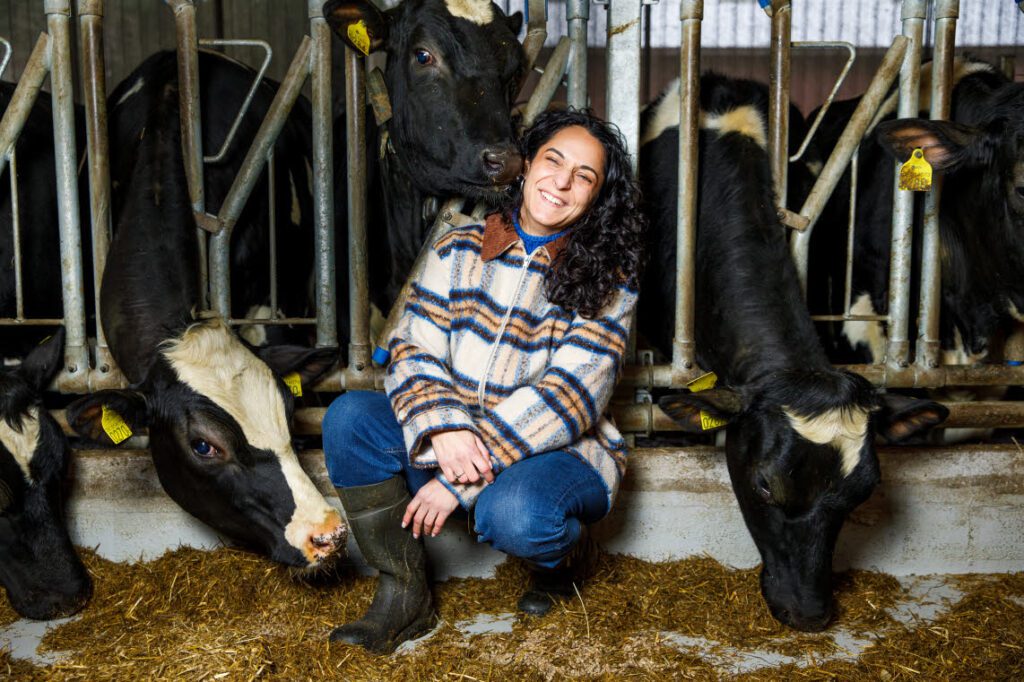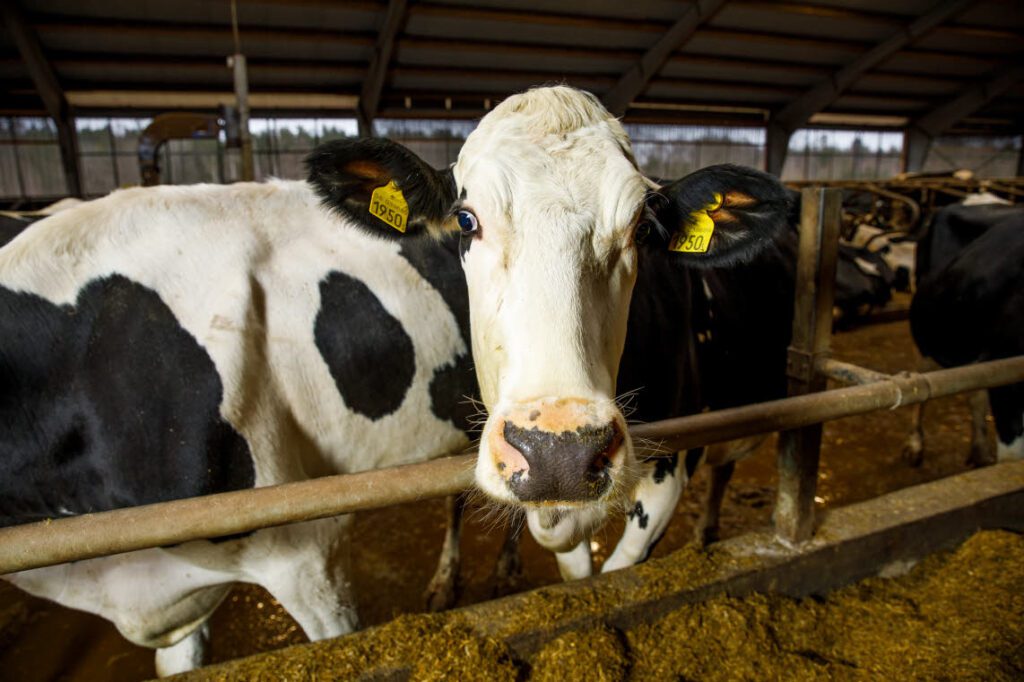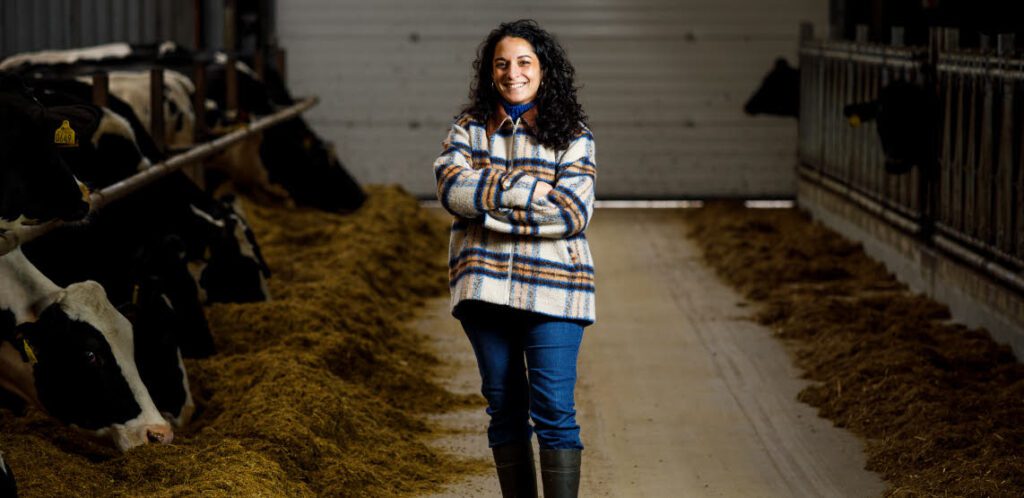Disclaimer:
An initial version of this article was published in May 2025 in Change Magazine- Linneus University’s publication under the title Lyckliga djur är en konkurrensfördel för Sverige. This version has been slightly modified to enhance clarity. All views expressed are those of the authors and may not reflect the positions of the rest of the project consortium.
When consumers in Europe are asked what is most important to them when buying meat, animal welfare ranks highest in all countries. For example, animal welfare is more important than whether the meat is organic or locally produced. But what is a happy animal? And how do we reconcile this with sustainable livestock farming? This is the subject of Daiana de Oliveira’s research.
Sweden’s world-leading position in animal welfare was one of the reasons why Daiana de Oliveira moved here from Brazil twelve years ago to conduct research on farm animals.
Sweden is a role model for the rest of the world when it comes to animal rights and builds on strong EU legislation. Swedish law guarantees that cows can be outdoors in the summer and that sows can move freely and socialise with their piglets and prohibits the cutting of pigs' tails. Outside Europe, it is mainly the market that regulates the situation of farm animals.
Daiana de Oliveira
Since spring 2024, she has been Professor of Farm Animal Welfare at Linnaeus University. The professorship, made possible by support from the Marie-Claire Cronstedt Foundation, is an investment in research on animal health and welfare in one of the country’s most densely populated regions, with extensive egg production, livestock and horse farming.
Research can solve many of the challenges facing farmers today, and having so many farms close to the university helps us both to generate new knowledge and to apply it. This could involve changes in animal husbandry, environmental conditions and management methods that improve operations, or interactions between humans and animals that reduce stress and prevent accidents.
Combining animal welfare and profitability
When it comes to animal welfare, everything is connected, from the individual animal to the farm and the livestock sector as a whole. The challenge for farmers is to provide better conditions for their animals while keeping their businesses profitable.
Daiana’s research focuses on finding solutions that combine our ethical responsibility for animal welfare with market demands. The starting point is that animals are sentient beings that can experience a wide range of emotions, from sadness and anxiety to joy and happiness.
‘One of the most important changes in research in recent decades is the growing understanding that animals have different personalities and motivations, which is reflected in how each individual adapts to the farm environment’ says Daiana.

There is no such thing as an average cow
Cows show significant variations in both physiology and behaviour. Some are bolder, others more withdrawn, they have different risks of disease and react differently to situations. In agriculture, dairy cows are often treated as if they were identical, but there is no such thing as an “average cow”.
One of Daiana’s research areas focuses on understanding individual differences in farm animals in order to improve both farm environments and animal husbandry. The goal is to create an environment where all animals can regularly experience positive emotions and develop their skills.
‘Positive emotional states arise when animals have the freedom to make choices and can set and achieve their own goals. When animals can explore their environment, make decisions and play, they develop their behavioural, cognitive and emotional skills. This leads to the animals becoming physically stronger and having a better immune system, which further improves their health,’ says Daiana, continuing:
Throughout my career, I have been driven by a fascination with understanding the individual animal. If we become better at understanding the variation between individuals, we can avoid many health-related problems and undesirable behaviours.
Collaborations around the world
Pathways – for sustainable food
Daiana de Oliveira is one of the leaders of the Pathways project, which aims to develop the European livestock sector, from farms throughout the production chain to consumers. The project has over 30 partners and a budget of SEK 100 million to investigate how different initiatives affect the climate, profitability, animal welfare and access to food. By creating different future scenarios, Pathways helps decision-makers and the industry understand the consequences of different choices.
‘In the project, I am responsible for interaction with stakeholders across Europe. In addition to researchers, the project also includes representatives from industry and individual producers who will apply the methods we develop, which is very important,’ says Daiana de Oliveira.
Re-Livestock – preparing for climate change
In the Re-Livestock project, Daiana is collaborating with researchers in Europe and Australia to prepare the livestock sector for climate change. This involves both finding ways to reduce greenhouse gas emissions linked to the industry and mitigating the consequences of rising temperatures. Her goal is to evaluate the effects of climate change on animals and develop strategies to reduce these effects.
‘We need to adapt our production systems to reduce animal suffering while ensuring that there is enough food. And the solutions for this need to be adaptable to different regions in Europe, as rainfall, warm nights and feed production will be affected differently.’
Investing in Animal Welfare
The big question is how farmers can improve animal welfare while maintaining profitability. Current legal requirements focus primarily on reducing suffering and stress for animals, rather than contributing to positive experiences. Any efforts that go beyond this must be economically justifiable.
But investing in animal welfare can pay off in the long run. One example is Daiana’s research on calves’ early life, an important period for their future behaviour and health. Currently, they are separated from their mothers after birth so that the cows can return to milk production, which is stressful for the animals. In nature, calves would stay close to their mothers for longer, which has many advantages.
‘In the short term, there is an economic loss due to reduced milk production, but in the long term it can benefit the farm because these calves grow up faster to become stronger heifers with better social skills and find it easier to cope with new situations.’
One of Daiana’s upcoming projects will investigate how important it is for dairy cows to be outdoors in the summer. Swedish law requires that cows be given access to green pastures, but this has recently been called into question. Critics argue that abolishing the law would reduce costs and make Swedish farms more competitive.
‘The fact is that we can never push prices down to the same level as the international market. There will always be someone who can produce milk and meat more cheaply somewhere else. However, we can compete on animal welfare. In this respect, Sweden is still among the best in the world, and I hope it will continue to be so.’
What is a happy cow?
Happy cows stay healthier and are also more productive. There are several things you can do to promote animal welfare, explains Daiana de Oliveira.
‘A happy cow has choices. It can move freely and follow its instincts. It is also important that the cow is well equipped for its environment: that it has built up sufficient skills and resilience to cope with both physical and mental challenges, has meaningful relationships with other individuals and lives in an environment that provides nutritious food and meets the animal’s needs. A happy cow has the opportunity to experience positive emotions frequently. ‘

